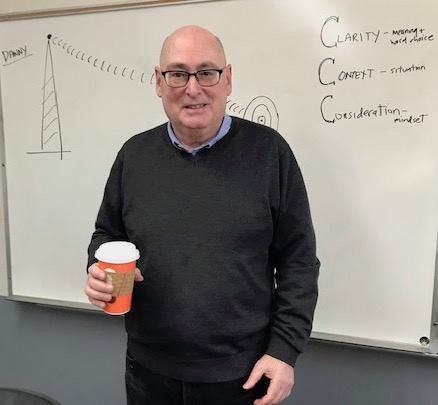
Q&A with Danny Flamberg, LiveWorld's VP Strategy – HCP
Danny Flamberg oversees LiveWorld’s Healthcare Provider (HCP) practice helping clients develop marketing strategies for pharmaceutical and life science brands. Danny earned an A.B., an M.A. and a Ph.D. in econometrics at Columbia University.
An Interview with Danny Flamberg
Can you share how you found your way to LiveWorld’s pharma team and what you’re looking forward to in this next chapter in your career?
My time at agencies such as Publicis, JUICE Pharma, Digitas, and Ammirati Puris Lintas and Lowe Worldwide enabled me to work with a lot of leading and insurgent pharma brands including AbbVie, AstraZeneca, GSK, Genentech, J&J, Merck, Novartis, Pfizer, Sanofi, and others. LiveWorld found that compelling and I was attracted to the vision of LiveWorld and their leadership bench strength. The position was a good fit for my career advancement which has exposed me to 20+ medical conditions (that I didn’t contract) and the nuanced world of pharma and life sciences marketing. Joining Live World is the next step in a robust career, leveraging my experience and my skill set to help an interesting organization realize more of its upside.
What trends do you see emerging for pharma marketers?
Intense competition and the consolidation of the pharma industry is dramatically changing the playing field, especially given the recent string of international mega deals. Other trends include the rise of immunological drugs, confusing studies and counter studies, the potential value of AI, the demise of private practices, the reign of insurers and epidemics of obesity, heart disease, diabetes and cancer. Also predictive modeling, VR, data driven treatment, and direct to physician data flows are on the horizon, which will create a new set of challenges for HCPs.
What are the biggest hurdles for marketers when trying to reach the modern clinician?
Gaining access is likely the most prominent issue pharma is grappling with today, but just as challenging is overcoming inertia, ingrained behaviors, communication gaps, and finding convincing competitive differentiation. Another challenge for healthcare professionals is explaining new science to their patients and how they can benefit from the next generation of life-saving treatments.
LiveWorld can be an adviser, a sherpa and an active participant in helping pharma firms sort out these issues and implement realistic, cost-effective and resonant communication campaigns.
How can HCP marketers approach some of these challenges?
HCP marketing tactics that are one size and one message for all channels have become stale and formulaic. Pharma needs to break away from this rote thinking to understand the dynamics and the division of labor between doctors and nurses. One diagnoses, the other delivers direct treatment, counseling and a more personal touch.
As a result, we need to discreetly discern the attitudes and motivations that drive and impact different behaviors before developing plans to deploy reps, websites, KOLs, events and emails. Martech creates opportunities for pharma brands to market 1-to-1 and 1-to-many, and to be more sophisticated in their approach to identify and engage HCPs on their own terms.
When it comes to HCP marketing, what tactics do you see as having the greatest impact?
Events and KOLs are tried and true. But leaning into non-personal promotion, visualization, interactive games and realistic simulations are paving the way to better HCP engagement and education.
When thinking about patient interaction with HCPs, does channel preference change by specialty? Do immunologists use different channels than cardiologist?
Channels are generally the same but messages and weighting differ. Many HCPs resent the fact that their word is no longer law and that their recommendations are compared to the treatments prescribed by Doctor Google, Dr. Wikipedia and Dr. WebMD. Some HCPs, like endocrinologists, rheumatologists, and immunologists, are introverts who identify with biologists and chemists more than Internists or Primary Care Physicians (PCPs) who tend to be extroverts. Most doctors choose specialties based on personality and lifestyle expectations. Understanding these choices can inform messaging that resonates.
Do physicians place a higher emphasis on certain types of product information such as dosing and safety data over real-world evidence or adherence programs?
It depends on the specialty. Physicians want to understand the science and see/evaluate the data first and foremost. They are dedicated to solving multivariate puzzles and finding the right treatment for each individual.
Given rep accessibility issues, what are some of the most important NPP tactics?
Marketing practitioners must develop messaging, channel and sequencing plans. If you lead with science and create on demand assets, they will come on their own terms. You have to be there where and when HCPs choose to connect. Straight talk and differentiation are critical.
Where do you look for marketing inspiration? Are the industry publications, pharma brands, or other industries you look to?
I read, watch, listen and inhale everything in the pharma industry, but I also read the New England Journal of Medicine, and a bunch of blogs and podcasts. I follow stocks of big and emerging biotech companies. And, I read marketing, advertising and technology trades.
How can more HCP marketers stand out from the crowd and break through?
Pharma brands have personalities. Expose more of those personalities especially in social media. Don’t be afraid of the on-going conversation and the opinions of peers and patients. Be willing to take a stand and advocate your position. Plain vanilla communications are death.
When not thinking about HCP marketing campaigns and strategies, how do you occupy yourself?
I’m a chef and I enjoy cooking for my family and friends and for strangers from around the globe who are part of the eatwith.com community. Social service volunteering is a passion of mine. For the last 20 years I have been a host at a homeless shelter, and I read every spy book I can find.
